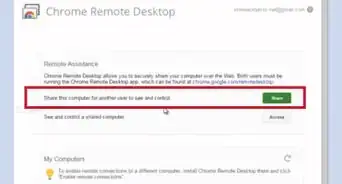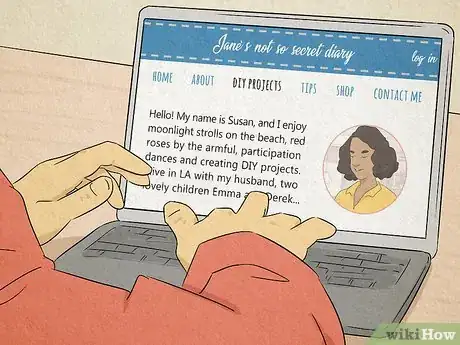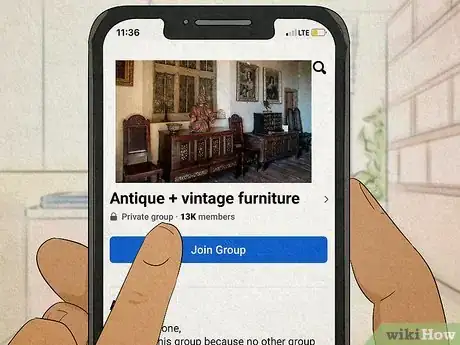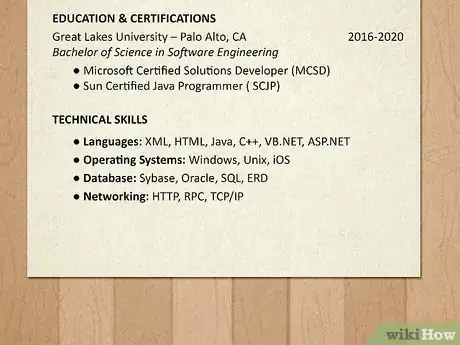This article was co-authored by Katrina Georgiou. Katrina Georgiou is a career coach and the founder of Katrina Georgiou Coaching based in Silicon Valley. Katrina helps individuals find new careers as well as career advancement, including resume writing, interview preparation, salary negotiation, and performance reviews. Trained in the co-active method from the Coaches Training Institute (CTI), Katrina uses personalized communication and leadership strategies to support her clients in building successful and fulfilling careers.
There are 11 references cited in this article, which can be found at the bottom of the page.
This article has been viewed 27,203 times.
Making money doing something that you love and that you’re good at may sound too good to be true. The truth is, it doesn’t have to be a dream! It may be much easier to make it a reality than you might realize. You can sell the skills you already have directly to people by working on specific projects or by teaching them how to do something. You can also use your skills to sell yourself and land a job or position that you love. To help you do it, we’ve put together a handy list of tools and strategies you can use to find the best ways to market and sell your specific skillset.
Steps
Find your niche.
-
Knowing your niche will make it easier for you to sell your specific skills. Think about the skills and experience you possess. Use them to help guide your networking energy and focus so you don’t waste your time putting effort into fields or industries that are unrelated to your expertise.[1] X Research source
- For instance, if you have an accounting degree and you spent years working at an accounting firm, think of an accounting-related niche that you can plug yourself into.
- If you’ve worked at different restaurants, you could use the experience you gained there to come up with an idea for a new restaurant of your own, as another example.
- The more specific your nice, the better you’ll be able to market yourself.
Use online freelance platforms.
-
Choose one that caters to your skillset. There are a ton of sites out there that connect people who need something done with people who have the skills to make it happen. Look for ones that are designed for people who have your particular set of skills. Set up an account and accept any offers that interest you![2] X Research source
- Popular examples of online freelance platforms include Fiverr, Upwork, and Guru.
- Look for sites that fit your niche. For instance, if you’ve got a background in graphic design, you could set up a profile on 99designs and accept any freelance work that you want.
Offer consulting services for specific projects.
-
Companies can hire you on a short-term basis. If you’ve got a ton of experience working in specific industries, take a look into consulting. It’s similar to freelance work in that you’ll be hired by a client or company to work on a specific task or project. When the job is done, your contract ends. Set up a consulting company and promote yourself as an expert in your specific industry. You can then reach out to companies looking to hire consultants or wait until a client reaches out to you.[3] X Research source
- If you worked as a stockbroker for years, for example, you could offer your services as a financial consultant to help businesses improve their investments.
- You may need certain certifications and licenses in order to set up a consulting business. You’ll also want a good-looking website so people can easily find and hire you.[4] X Research source
Start a blog.
-
You can monetize it through links and ads. Make a blog and design it so it’s clean and easy to read. Write about interesting, informative, and relevant topics related to your specific field and skills. Spread the word about your blog on social media, email, and by word-of-mouth. As you gather more readers, you may be able to sell your services and allow paid advertisements on your page that can earn you money just by having people visit your site.[5] X Research source
- For instance, if you know a lot about deep sea fishing, you could start a blog about it! Write about cool things going on and fun trips people can take. You can even add your contact info if people want to hire you to take them fishing.
- Popular blogging sites include Wix, Medium, and WordPress.
Write a book.
-
Sell it as a PDF or through online e-book services. Having a book can be both a great way to market yourself and a nice way to make some money whenever people buy it. Write about things you’ve experienced and problems you’ve solved in your area of expertise. Format the book so it’s easy to read and looks visually appealing. You can upload it to Amazon so people can download it, or sell it yourself through a website.[6] X Research source
- For example, you could write about your years working as a chemical engineer and use it to help sell yourself as a consultant to energy companies.
- Look into hiring an editor to help you make sure your book looks and reads great.
Offer classes to teach others your skills.
-
You can sell them online or in person. If you’ve got a lot of experience and skills you’ve mastered, you can teach them to others! Put together a course that imparts your knowledge and market it to people in your specific niche. People can buy an online course and learn from you in their own time, or you can hold in-person or virtual classes to teach people in real-time.[7] X Research source
- If you’re a master carpenter, for example, you could offer a class that teaches people how to build decorative birdhouses. Or, if you’re a really experienced guitar player, you could sell lessons to teach other people.
Tutor people interested in learning one-on-one.
-
It’s another great way to earn money teaching others. Start up a tutoring business that teaches some of your specific skills to people interested in learning from someone with knowledge and experience. Sell your services online and meet with your students either in person or remotely to teach them![8] X Research source
- Tutoring can be really great for academics. For instance, if you’re a math whiz, you could tutor students who want to improve their grades.
Start a YouTube channel.
-
Post tutorials, link out to your services, and allow ads. Create a custom channel on YouTube with a name and layout that makes sense for your content. Record yourself going through or explaining a process step-by-step and post it to your channel. Add links and information to the video’s description so people can find out more or hire you for your services. You can also allow ads to run on your videos, which can generate some income for you as well![9] X Research source
- For example, if you’re great at building model cars, you can create a channel called “Model Shop” and record yourself painting or building one of your models. You can turn on ads and add links to the video’s description that lead to your website so people can purchase from you.
Look for niche networking groups on social media.
-
You can meet people who may become contacts or customers. Check out LinkedIn and Facebook for groups you can join. Chances are there’s a group out there related to your skills and experience. Search for them on social media platforms and join any that seem useful, interesting, and relevant. You may be able to sell your skills directly to others in the group and you may find work by networking with other people in the groups.[10] X Research source
- For instance, if you’re skilled at restoring antique furniture, you could join a group related to restoring antiques. If someone in the group needs a job done, you just might fit the bill!
Attend local events related to your niche.
-
Join or volunteer with a local group and meet like-minded people. While much of the business world is online, there are still advantages to networking with people in person! Look for business events or events related to your specific skills and experience. Sign up to attend the event or volunteer to assist. Talk to other people at the event and exchange contact information with anyone who seems like they may need your services or could refer you to people who do.[11] X Research source
- If you have a background in copywriting, for example, you could attend a marketing event and talk to people who might be interested in hiring your services.
- Some events may not seem directly related to your niche at first. For instance, if you love to draw and paint, you could attend a comic convention and network with companies and writers who may be looking for artists.
List your training or qualifications on your CV.
-
They can help sell yourself to potential employers and customers. A curriculum vitae, or CV, lists all of your experience, awards, publications, and skills.[12] X Research source Make sure you include any special training you completed or certifications that you earned, which will demonstrate your willingness to seek out new learning opportunities and make you look more attractive to employers and clients.[13] X Expert Source

Career Coach Expert Interview. 25 June 2020. [14] X Research source- In today’s constantly changing world, showing your ability to stay current and learn new skills is super useful.
- For instance, if you work with computers, you could list the programs, software, and coding languages you’ve studied and are certified in.
- If you don’t have a CV, no worries! You can easily make an impressive one and use it to help market your experience and skills.
Highlight additional skills in your CV.
-
They can illustrate the wide variety of skills you have. Spend some time thinking about the skills you’ve learned through hobbies that you’re into, volunteering opportunities you’ve done, as well as from just studying on your own. Add them to your CV as well. Don’t be afraid to broadcast the wide range of skills and experiences you have to offer![15] X Expert Source

Career Coach Expert Interview. 25 June 2020. [16] X Research source- For example, if you’ve spent years working as an engineer, that’s a great thing to include on your CV, for sure. But if you’re also super into flying RC planes and you’ve built some of them yourself, include that in your CV as well! It’s interesting and it could be relevant for a potential job.
- If you’ve volunteered with organizations like the Special Olympics or Habitat for Humanity, definitely include them on your CV as well as skills you may have learned, such as working with others and assisting people in need.
Apply for jobs that meet at least 75% of your qualifications.
-
You’ll have a better chance at landing them. It may seem obvious, but one of the best ways to sell your skills is to get a job where you get to use them! When you’re looking for potential jobs, compare your skills and experience to the job’s requirements and qualifications. If you can satisfy at least 75-80% of them, then it might be a great fit for you. Try applying for it and seeing what happens.[17] X Research source
- For instance, if a gym is looking to hire a trainer that specializes in teaching boxing, swimming, weight lifting, and yoga, but you’re not as experienced with swimming, you can try to apply and learn it on the job or through training.
- If you’re able to meet the majority of a job’s requirements, then you’ll likely be using most of your skills to do it.
Reach out to people who can help you land a job.
-
Enlist an advocate to help sell yourself to an employer. Some career experts estimate that having an advocate at a job you’re applying for can make it 10 times more likely for you to get it. Take advantage of people in your network! Get in touch with friends or family as well as professional contacts that you’ve made. Ask if they can lend you a hand.[18] X Research source
- If you’re trying to land a contract job with a software company, for example, and you know someone who works at the company or has worked with them before, ask them if they can put in a good word for you. It could make a huge difference.
Warnings
- Don’t misrepresent yourself or your skills or it could hurt your image and make it difficult for you to find people willing to hire you.⧼thumbs_response⧽
You Might Also Like
 20 Good Excuses to Miss Work on Short Notice
20 Good Excuses to Miss Work on Short Notice
 How to Call in Sick When You Have Diarrhea
How to Call in Sick When You Have Diarrhea

 How to Respond When a Recruiter Reaches Out: 3 Email Templates and Key Tips
How to Respond When a Recruiter Reaches Out: 3 Email Templates and Key Tips
 Flirty or Friendly? 12 Signs Your Coworker Might Actually Be Flirting with You
Flirty or Friendly? 12 Signs Your Coworker Might Actually Be Flirting with You
 20+ Believable Excuses for When You’re Running Late
20+ Believable Excuses for When You’re Running Late



 15 Basic Skills You Need to Be a Good Housekeeper
15 Basic Skills You Need to Be a Good Housekeeper
 How to Find Out Where Someone Works: The Ultimate Guide
How to Find Out Where Someone Works: The Ultimate Guide


 How to Unionize Your Workplace in 8 Easy Steps
How to Unionize Your Workplace in 8 Easy Steps
References
- ↑ https://www.nbcnews.com/better/pop-culture/looking-new-job-here-s-how-sell-yourself-your-skills-ncna952276
- ↑ https://financesonline.com/freelance-platforms-analysis-features-benefits-pricing/
- ↑ https://money.usnews.com/money/blogs/my-money/articles/2017-12-19/how-to-make-money-by-teaching-others-your-professional-skills
- ↑ https://www.entrepreneur.com/article/41384
- ↑ https://money.usnews.com/money/blogs/my-money/articles/2017-12-19/how-to-make-money-by-teaching-others-your-professional-skills
- ↑ https://medium.com/due/make-money-online-5cfb6aa82b38
- ↑ https://medium.com/due/make-money-online-5cfb6aa82b38
- ↑ https://www.sidehustlenation.com/start-a-tutoring-business/
- ↑ https://medium.com/due/make-money-online-5cfb6aa82b38
- ↑ https://www.nbcnews.com/better/pop-culture/looking-new-job-here-s-how-sell-yourself-your-skills-ncna952276
- ↑ https://www.nbcnews.com/better/pop-culture/looking-new-job-here-s-how-sell-yourself-your-skills-ncna952276
- ↑ https://www.thebalancecareers.com/cv-vs-resume-2058495
- ↑ Katrina Georgiou. Career Coach. Expert Interview. 25 June 2020.
- ↑ https://www.theguardian.com/careers/careers-blog/job-career-how-to-sell-yourself
- ↑ Katrina Georgiou. Career Coach. Expert Interview. 25 June 2020.
- ↑ https://www.theguardian.com/careers/careers-blog/job-career-how-to-sell-yourself
- ↑ https://www.aiuniv.edu/blog/2015/may/market-your-skills-on-your-resume
- ↑ https://www.cnbc.com/2018/09/18/how-to-sell-yourself-when-you-dont-have-the-exact-experience-required.html
About This Article



























































